
Fans of the Colorado Avalanche have not had much Stanley Cup playoff hockey to watch in recent seasons, and I don’t expect many are too familiar with their upcoming opponent, the San Jose Sharks. For starters, they occupy different divisions and haven’t met in a playoff series in ages –though they have in the distant past, even playing through a mid-game earthquake once.
Those Avs fans who want to learn about the Sharks, The Hockey Writers is here to help. We’ll go over the roster, give you a feel for the team and players, and cover some of the special situations.
Under fourth-year head coach Peter DeBoer, the Sharks became an offensively-oriented team for the first time in his tenure. Still, how tight they play defensively has a lot to do with whether they win or not. The team finished the season 32-0-0 when giving up two or fewer goals. The pattern held in the playoffs, three of their four wins in the brutal opening round series against the Vegas Golden Knights came when they surrendered two or fewer tallies.
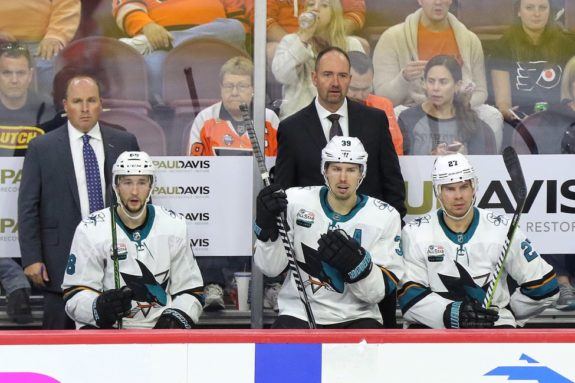
In the offensive zone, the team is driven by power forwards and a pair of elite offensive defensemen.
The Sharks Battle Attrition
The playoffs are often referred to as a battle of attrition and the Sharks are not winning on this front.
While no team is fully healthy, the Sharks are at risk of becoming a MASH unit. Timo Meier was injured late in the season and his shot seems a bit off, though his skating is strong. Erik Karlsson is not right and at times, his skating was poor in the series against he Golden Knights, though he improved in the latter games of the series. As of this writing, Joe Pavelski’s availability is unknown (it won’t be in Game 1). The last we saw of him was a gruesome moment, he was being helped off the ice after being knocked out and bleeding profusely in the final game of the series against Vegas.
Logan Couture had a good series, though he lost teeth in one game and blocked a shot with a body part no man wants to block a shot with. Marc-Edouard Vlasic took a puck up high in the second game of the Vegas series and missed the rest of the game the next two which followed. He returned for Game 5 and seems fine at this point. Joonas Donskoi absorbed a big hit in Game 6 of the series and was out for the final game. Pugilist Micheal Haley blocked a shot with his ankle in Game 3 of the series and missed the remainder. In the Sharks morning practice on Thursday, Donskoi, along with fourth line forward Melker Karlsson missed practice, the latter’s absence was not explained.
Earlier in the season, the Sharks defenseman Radim Simek tore up his knee and it is unlikely he returns at any point this season. He won’t be part of this series.
Vlasic, Pavelski, Meier and Erik Karlsson are big deals. Pavelski and Meier were both 30-goal scorers this season, while Erik Karlsson was an MVP candidate before his injury. Donskoi is a quality depth forward. Only Haley probably shouldn’t be in the lineup. Vlasic, Couture, Karlsson and Meier will play. The availability of Pavelski, Donskoi, Melker Karlsson and Haley is an open question.
-
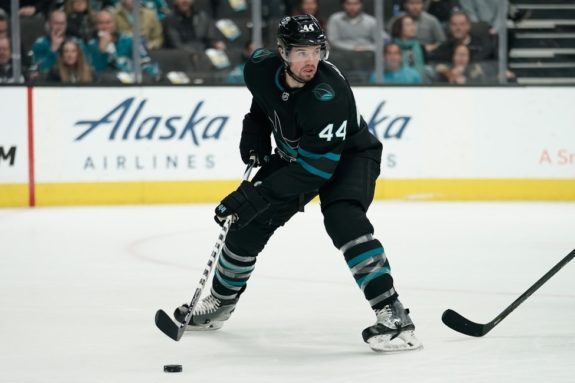
Marc-Edouard Vlasic (Stan Szeto-USA TODAY Sports) -
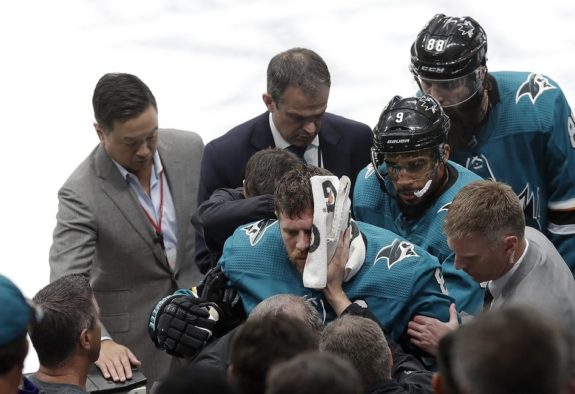
Joe Pavelski (AP Photo/Jeff Chiu) -
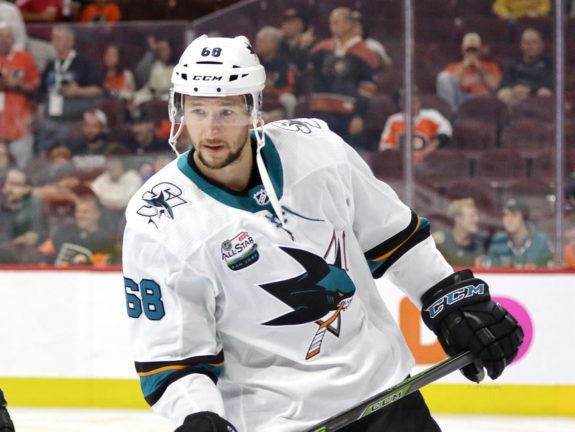
Melker Karlsson (Amy Irvin / The Hockey Writers)
When healthy, the Sharks are a deep team, giving them a chance to win with secondary players who’d be more prominent on lesser teams. Nine players tallied over 50 points this season, 12 tallied double-digit goals, four of those netted 30 or more scores. The quantity of the team’s injuries, though, challenges their depth.
The Sharks barely survived the emotional, tough matchup (in many ways) against Golden Knights. Both physical and emotional issues may carry over into this series.
That said, the Avalanche pose very different challenges than the Golden Knights.
The Sharks’ Keys
In an earlier piece, I covered what the Sharks need to do to win games and the four keys I identified remain on point. Offensively, go behind the net. Get good goaltending from Martin Jones. Limit opponents quick-strike scores, with extra vigilance to avoid allowing odd-man rushes. And leverage a potentially lethal the power play by drawing penalties and scoring on the opportunities.
Two players to watch carefully are Erik Karlsson and Tomas Hertl. Karlsson can create all kinds of offense from his defensive position. He had nine assists in the series against Vegas, including a beauty for the series winning goal. Power forward Hertl is the Sharks player other teams have most struggled to handle. It’ll also be interesting to see if the Sharks other athletic power forwards, Evander Kane and Timo Meier, take a cue from Hertl and play behind the net.
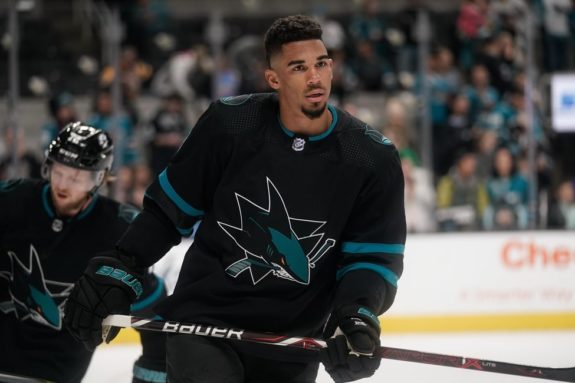
San Jose Sharks’ Goaltending
The Sharks are backstopped by goalie Martin Jones (jersey number 31). Barring injury, you can expect to see Jones play every minute of every tight game. It has been a down season for Jones. His save percentage (SV%) on the season is .896, by far a career worst. Early in the season, he struggled behind a porous Sharks defense which allowed numerous odd-man rushes. The Sharks have tightened things up a good bit, at least until recently, and there are times Jones has looked good.
It was more of the same in the series against Vegas, with Jones resembling both Dr. Jekyll and Mr. Hyde. He was pulled in two different games before the second period and gave up six goals in a third. But he also saved 58 of 59 and stole Game 6. For the Sharks to have a good chance in the series, Jones needs to play well, consistently.
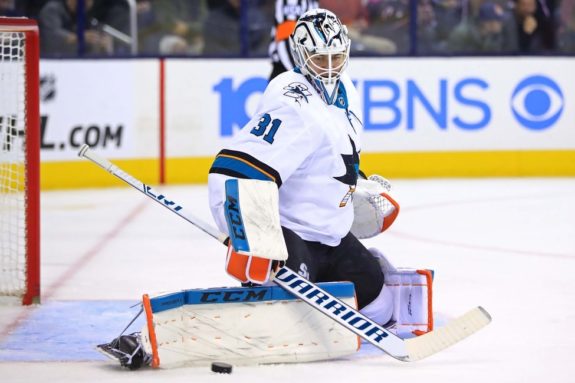
Jones has been good in the playoffs, entering this year with a .926 SV% over his playoff career. In 2015-16, the season Jones backstopped San Jose to the Stanley Cup Final.
Backup Aaron Dell (30) also had a down season, though its unlikely he sees meaningful action. Dell posted a .886 SV%, and sadly, it is a reflection of his play over the course of the season.
The Sharks’ Blue Line
San Jose throws challenging defenders at opponents. The pairings are essentially set. Six defensemen will play: Brent Burns (88), Marc-Edouard Vlasic (44), Erik Karlsson (65), Brenden Dillon (4), Justin Braun (61) and Joakim Ryan (47). The seventh, Tim Heed (72), is the odd man out.
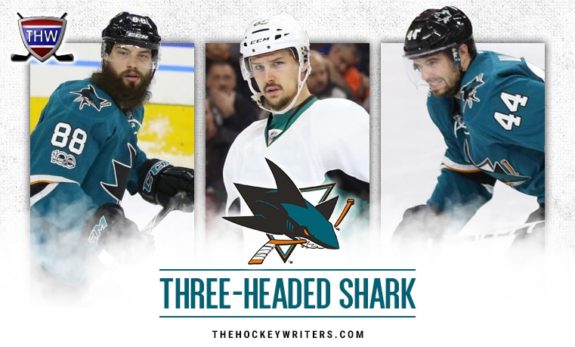
Burns (16G, 67A, plus-13) is a Norris Trophy finalist and the league’s top scoring defenseman. His best available partner is Ryan (0G, 7A, minus-1). Radim Simek was the best partner, but he is out. Dillon (1G, 21A, plus-19) has been excellent when paired with Karlsson (3G, 42A, plus-6). The best partner for Vlasic (3G, 22A, minus-6) has been Heed (2G, 11A, plus-9). Alas, this leaves veteran Braun (2G, 14A, minus-14) out of the lineup and DeBoer won’t leave Braun out of the line-up.
In the opening round, the pairings were Burns-Vlasic, Dillon-Karlsson and Ryan-Braun. However, DeBoer frequently cut his defenseman usage down to five (mostly by benching Ryan within the game) at which point the pairings became highly fluid.
Ryan is a frequent occupant of the coach’s doghouse, was used sparingly in the series against Vegas. He totaled just 69 minutes of ice time spread out over what amounted to nearly eight games worth of opportunity. Still, Vegas never scored with Ryan on the ice.
The Karlsson-Dillon pairing was exceptional together for the six weeks they were partnered beginning in early December, ending with Karlsson’s mid-January injury. They were both challenged in the Vegas series.
Vlasic and Burns both had a strong series against Vegas, the Sharks were stunningly better with Vlasic in the line-up. In the time he played, the Sharks outscored Vegas 20-12, without Vlasic, the Sharks were outscored 13-3.
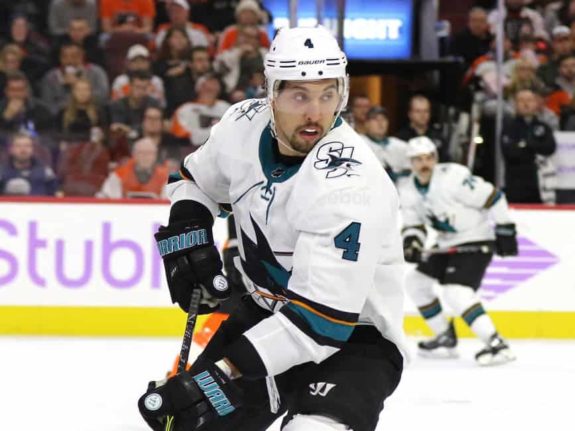
Vlasic is known as an elite defenseman, but it wasn’t the case most of the season, his first ‘minus’ season in over a decade. Vlasic will be key to the series, he’ll get the shutdown assignment so expect to see him on the ice against the Avs’ top line. He’s succeeded in slowing down elite players in playoffs before, including the likes of Vladimir Tarasenko and Connor McDavid. The Avs’ top line is a highly talented trio and Vlasic alone won’t stop all three.
Heed, a former forward, is small and agile, with a big shot. Heed’s defensive work isn’t great, but his chemistry with Vlasic is real. Heed made his NHL playoff debut when Vlasic was injured and played in two Sharks losses. He likely only plays if there is an injury, but he is very capable.
Braun has had a tough season. He’s been beat regularly and in most every way imaginable. He peaked at plus-six on Nov. 1 and has been minus-20 since. Braun had a decent opening round series, something encouraging for the Sharks.
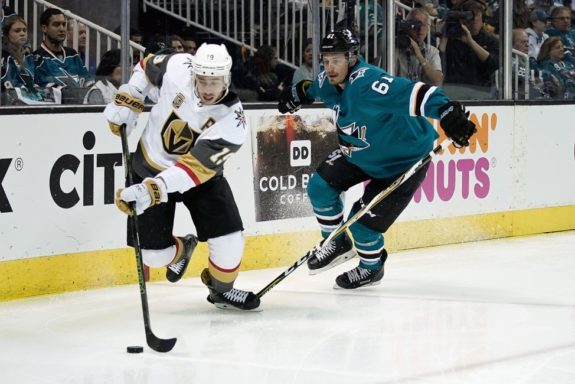
Ryan lost his starting job opposite Burns to Simek. Simek played very well, but torn knee ligaments have him out for the playoffs. Ryan is a smooth skater and good puck handler, but can be physically overwhelmed. In the past, he complimented Burns well. But Ryan’s uneasy relationship with the coach has hurt the player. Ryan plays like he needs to avoid any mistakes, which is not how a player succeeds. That said, he did have a solid series against Vegas, finishing plus-2.
Burns is a tour-de-force. He led the league in points by a defenseman and his plus-13 rating is indicative of a player who did a lot of things right. He’ll still make plenty of mistakes, but his athleticism is second to none and the amount of ice he covers is enormous. His wrist shot from the point is the best in hockey, though overrated as a weapon. It is his ability to mix things up by shooting for tips and deflections which makes him a threat.
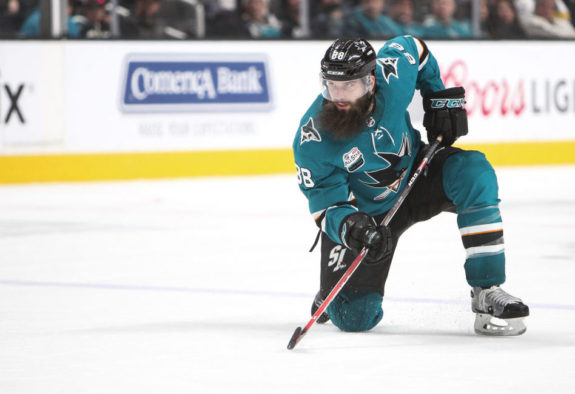
A big risk with his point shot is getting it blocked and turning into an odd-man rush the other way. Burns is incredibly dangerous when he goes from defenseman to power forward, something he can do in the blink of an eye. He restrained himself from doing this in the series against Vegas and was more defensively responsible. He is good on the power play and surprisingly good on the penalty kill.
Erik Karlsson, specifically his health, is the big unknown. While Burns is a Norris finalist, Karlsson might actually be the team’s best defenseman. For a quarter of the season, beginning in early December, he was probably the best player in the league. His numbers reflect the totality of his season, including a rocky start and injury issues since just before the All-Star break. At his best, he changes everything. His on-ice vision is remarkable and he can create offense seemingly out of nothing. He froze the entire Vegas defense before sending a perfect touch pass to Barclay Goodrow for the series winning goal. Karlsson was on the ice for a large portion of the goals Vegas scored in the series. Largely due to his injuries, his defense is a liability.
Another set of questions surround Karlsson and his potential to reach free agency. Karlsson hasn’t re-signed in San Jose, though he’s been eligible to do so since late February for an eight-year deal (and a seven-year deal before then). He can become a free agent in July. A big payday awaits, but could the contract situation impact his play? Or might it serve as a distraction? So far, there are no signs of this being an issue. That could change.
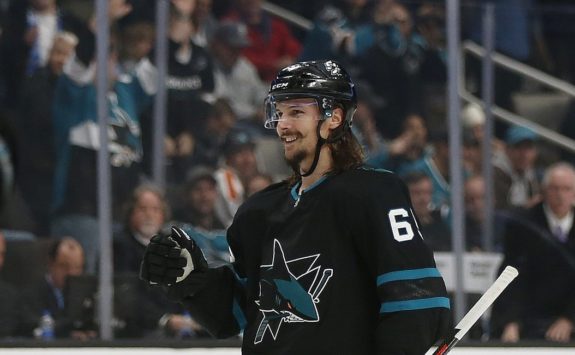
Dillon is a big and physical player. He had an excellent regular season, really a breakthrough season. He was partnered with Karlsson when Karlsson took off. He’s paired well with others, too. Dillon’s skating has improved enormously over the past few seasons (the word pylon was used in years past, but no longer), his passing and positioning have improved as well. He leads the Sharks in plus/minus and while he’s clearly not their best defenseman, the result is not a fluke.
It is worth noting Dillon was on the bench but did not play for most of Game 7. Whether DeBoer was unhappy with Dillon’s play or Dillon was dinged up is unclear. This feels like a ‘game specific’ issue and he practiced on Thursday. We’ll keep an eye on it to see if is anything more.
The Sharks’ Forwards
The Sharks are a power-forward-driven team, with Hertl, Kane and Meier all getting to 30 goals this season. The Sharks have plenty of skill in the top nine forwards, though injuries will take away from the normally strong fourth line. The Sharks’ top power forwards are tough to handle for any team. Vegas is among the few well-suited for the task and it wasn’t easy for them either.
The Sharks must use their power players and emphasize playing behind the net. The Avs present a tough defensive matchup, but if the Sharks are relentless in going behind the net, they can win. If they chose not to go back there, they’ll be helping their opponent.
The forward lines are not completely set at this point, the injuries playing a major role, but I don’t expect a lot of juggling. I’ll assume Pavelski is out and Donskoi is in
The Sharks’ top line will include Meier (28) and Logan Couture (39). Pavelski (38G, 26A, minus-4) was also on this line, but I won’t expect him back. Couture (27G, 43A, minus-6) struggled in the season’s closing month and had a brutal physical series against Vegas, but also totaled six goals, including two on the power play in Game 7 which turned the series.
Meier (30G, 36A, plus-9) missed the season finale after falling awkwardly in the game before and many think he has a wrist injury. There was evidence in the opening round to suggest he’s still not right. He was the best player on the ice in the overtime in Game 7, he had about five good scoring chances in those 18 minutes.
Gustav Nyquist (14) is a candidate to join this line. Nyquist (6G, 5A, plus-1 in 19 games as a Shark) came from the Detroit Red Wings at the trade deadline and the results have been mixed. He is quick with a goal-scoring touch (22 for the season), but doesn’t win a lot of battles and still seems to get lost on the ice too often. He notched three assists in the opening round series.
The powerfully built Meier is the wild card here. He is just 22, whether he is ready to take the next step as a playoff performer is the question. He has the talent and tenacity. He’s also strong as a bull. On this line, he is the guy San Jose needs to go behind the net.
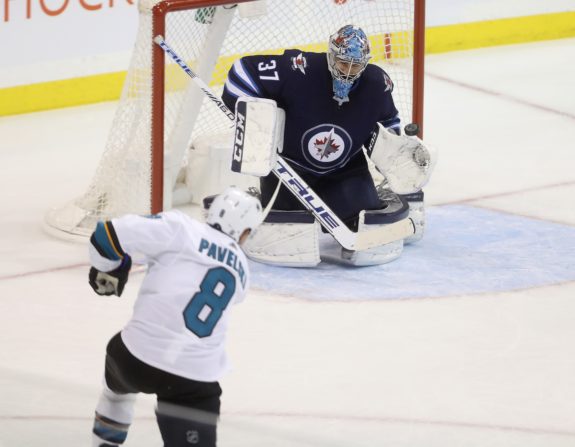
The Sharks have had success pairing Hertl (48) with Kane (9). The duo has been excellent. Hertl (35G, 39A, plus-5) is a handful and is the Sharks best forward. Don’t be surprised if Hertl proves the one guy the Avs have trouble stopping. They won’t be the first team. Hertl had six goal, eight points and an overtime short-handed winner against the Golden Knights.
Kane (30G, 26A, minus-4) is the most dynamic player with great speed and spends too much time in the penalty box. Vegas largely neutralized him.
Joonas Donskoi (27) has been effective with the group and assuming he is healthy, I anticipate he joins this line. He was steamrolled by the Golden Knights’ Brayden McNabb in Game 6 on a hard, clean hit. Donskoi (14G, 23A, plus-10) is a good passer and complimentary player. He also hasn’t scored a goal since the team’s Jan. 10 win over Vegas, which has led to suggestions he hasn’t been playing well. Bad luck, modest ice time and no power play time are bigger culprits in the slump.
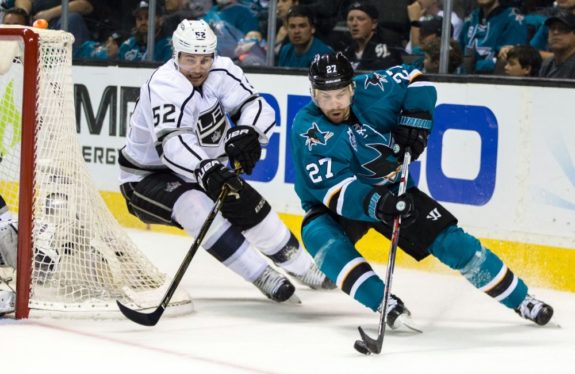
The Sharks’ third line is clear. Joe Thornton (19) centers Kevin Labanc (62) and Marcus Sorensen (20). Labanc put up career numbers (17G, 39A, minus-1). Though his defensive game has improved from last season, it is still lacking. At least it is no longer a shock when he wins a puck battle.
Labanc became a bit of a celebrity by garnering four points on the Sharks frenzied five-minute power play in Game 7, setting at least one NHL record in the process. At five-on-five, though, he is less dangerous.
Sorensen (17G, 13A, plus-10) is small, very quick and surprisingly physical. Though he had respectable numbers this season, it felt like he probably deserved better. He can be a thorn in the side of opposing teams.
Thornton (16G, 35A, plus-8) had a difficult start to the season, likely related to recovering from knee surgery. But in the last couple months, he’s turned back the clock a good bit. The future Hall-of-Famer isn’t the top line center of years past, but in a third line role, he’s a nightmare for other teams.
There is also an inspirational aspect to Thornton. He is running out of years and while he sits with legends on a variety of NHL all-time lists, he lacks a Stanley Cup. No doubt, his teammates are anxious to change this. The more it feels like this might be the year, the more intense this factor becomes.
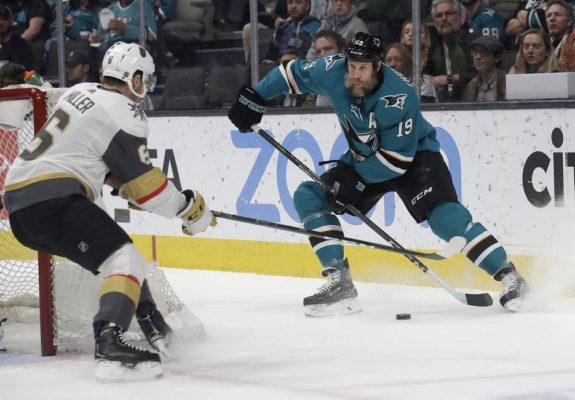
The rest of the Sharks forwards will comprise the fourth line and bench. Game 7 hero Barclay Goodrow (23) centers the line, though the wingers are not clear. Melker Karlsson (68), Lukas Radil (52), puncher Micheal Haley (18) or youngster Dylan Gambrell (7) are the candidates. The Sharks AHL affiliate, the San Jose Barracuda, was eliminated from the playoffs earlier this week, it is possible other forwards will be available beyond this group.
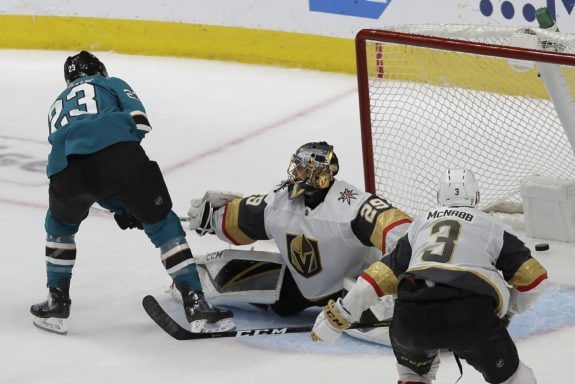
As of now, I’d expect Karlsson (12G, 4A, minus-1) will be one winger. Like Goodrow (7G, 9A, plus-4), Karlsson is an effective penalty killer. Radil (7G, 4a, plus-7) is an effective player as well, it wouldn’t surprise me to see him out there. He did play in Game 7, though DeBoer gave him just two minutes of ice time. Both Goodrow and Radil fit the power forward mold, which is so critical the Sharks. If DeBoer goes with the tough but ineffective Haley, it is a win for the Avs.
The San Jose Power Play
The Sharks’ power play is less of a weapon than it might be. The team doesn’t draw enough penalties and their conversion rate has been below the level their firepower indicates. Erik Karlsson, Burns, Thornton, Couture, Hertl, Kane, Meier, and Nyquist is just a ridiculous amount of firepower (even without Pavelski). Add in Labanc, who thrives in more open ice, and San Jose can roll two units, both incredibly dangerous.
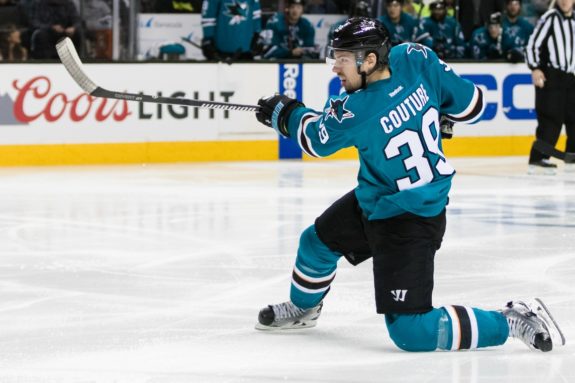
During the regular season, the power play underachieved. And it underachieved in a big way for the first six game and 50 minutes in the series against Vegas, scoring just four times and giving up two short-handed tallies. The power play came to life on the five minute major to Vegas with just ten minutes left in regulation. And my goodness, did it ever roar, scoring four times to turn a 3-0 deficit into a 4-3 lead.
Winning more faceoffs to start the power play will be very helpful. Better offensive zone entries would also make a difference. These were issues in the regular season, Vegas did an excellent job in these areas for six games plus two-and-a half periods. The Sharks power play can be exceptional, but it has been mediocre all too often. If the breakthrough in Game 7 continues into this series, it spells trouble for the Avs.
Sharks’ Penalty Kill
The Sharks’ penalty kill was terrific for a good chunk of the season, then faded badly in the latter parts. Against Vegas, the penalty kill was abysmal. The Sharks do not take a lot of penalties, but in the highly physical series against Vegas, they took more than normal and Vegas nearly won the series because of their power play.
For the Sharks, ‘returning to form’ will be critical. They have been good in the past, the issues are correctable. But they weren’t corrected against Vegas. The Sharks will use many of their top players on the penalty kill, including Burns, Hertl and Couture.
How the Sharks Win
For the Sharks, it usually boils down to defense and goaltending. Neither has been consistent this season. The stat bears repeating, the Sharks were 32-0-0 when allowing two or fewer goals in the regular season, they’re now 3-0 in the playoffs. They have enough offense to win games if they play a disciplined game.
If the Sharks falter, I expect it will be mental errors from a physically beat-up and fatigued team. There might also be some emotional/intensity challenges, given the nature of the last series. DeBoer plays his top players huge minutes, this is an area of vulnerability against a team which sustains pressure.
Expect plenty of line and defensive pair juggling from DeBoer, with players like Donskoi and Ryan on particularly short leashes.
The good news, the Sharks know how to play better than they did late in the season. They know the formula for success and it was reinforced in the opening round series.
The Sharks are at their best when they stay focused and return to the form they showed for major chunks of the season. We’ll see if this Sharks team shows up – starting on Friday.